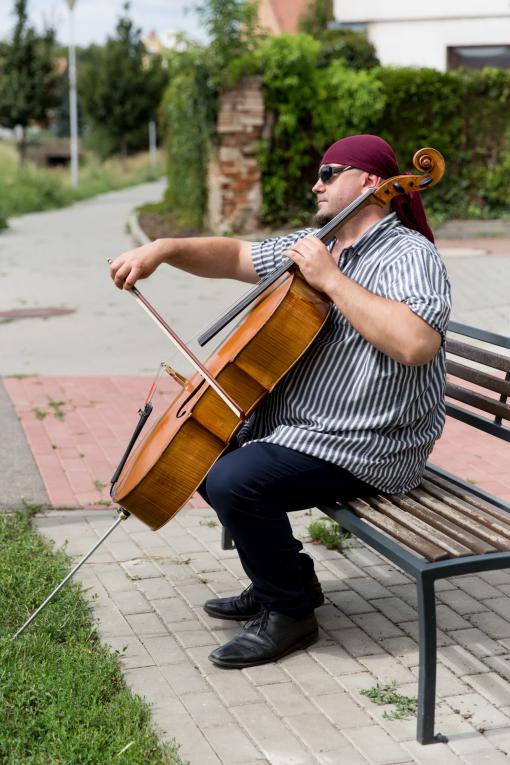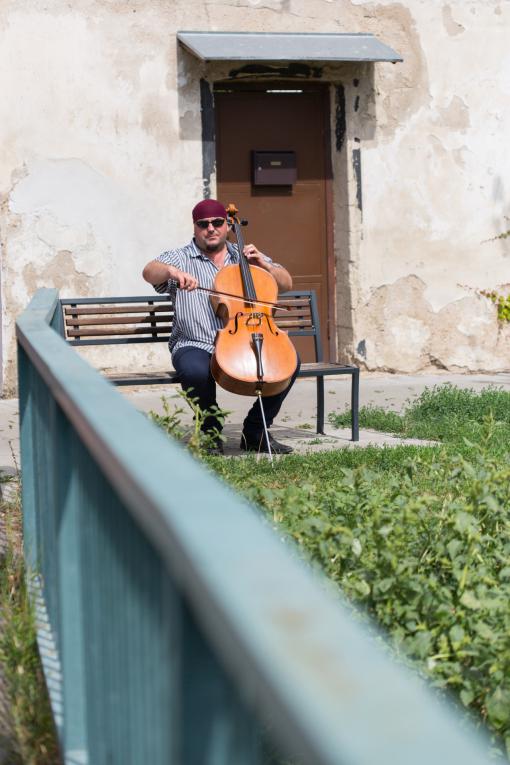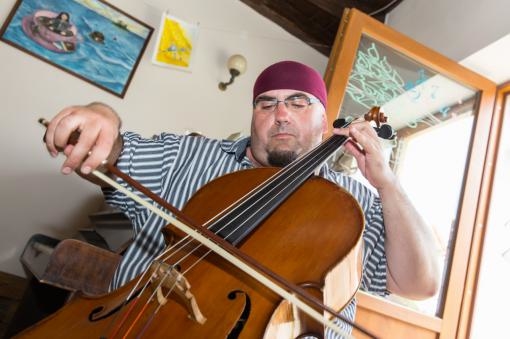Only rarely one single song is the main topic for an interview. In the case of the cellist Josef Klíč, the concert master of the National Theatre in Brno, this was offered. It does not happen every day that a Czech composer and his song reach the finals of a worldwide competition. However, there were more reasons for our talk – memories of the late Jaroslav Erik Frič, Josef's contract at the Janáček Theatre and the upcoming new album.
Josef, you recently celebrated success in a worldwide competition. What was it exactly about?
It is called the International Songwriting Competition, announced by an organization based in Nashville, and it all runs on the Internet. It is a competition songwriting of different genres, and jurors include people such as John Mayall and Tom Waits. The competition runs in various categories such as Country, R&B/Hip-Hop, Rock and so on. I signed up for the category Instrumental, but even in this case it was about writing songs.
Some people may find the phrase "instrumental song" as a contradiction. So how shall we define a song so that it is a song even without words?
A song without words is a song in which you can put any lyrics. It has a melody and you can sing the lyrics to it for yourself. Hence, it must be a song with an expressive melody. However, the form of songs without words in fact existed in even the Renaissance times. Madrigals were written either for vocals or instrumental. Therefore, it is not a novelty, songs without words have been here practically since the onset of music.
What do you think about when composing such a song without words? Is it a picture, a story…?
For any composition, one must have some sort of an inner impetus. Something from the outside always influences me. The song we are talking about doesn't have words, but it has a story, even though I don't want to talk about it publicly.
So you put something of yourself into the song, you don't reveal what it is about, and you let it down to the listeners to create their own story…
Yes, exactly. The name of the song can show them a direction. The song is called Scarred Heart's Grin. I do not want to impose on the listener what it is all about directly. They can embed their own story into the song, and it is only that name that serves as a certain clue.

Did you write the song specifically for the competition?
Yes, I did, but based on a motive I had had in my head before. I recorded cello for Petr Hromádka in a song that he sent to the competition. And it was recorded in the studio of Luboš Malinovský, who also sent his song, and I also recorded cello for him. They told me that they couldn't pay me a fee, but I could record a song in that studio and send it to the competition as well. So, from one day to another, this song came about.
You recorded it by yourself, but the result sounds like an entire band.
Yes, I've been working like this for a long time, it's a classic studio technique. Similarly, I recorded Requiem for Magor or incidental music for The Makropulos Case, which premiéred in 2006 at the HaDivadlo theatre. I use layering of cellos and sometimes even vocals one over another. I have everything written in my notes – I have some kind of a score of the whole orchestra, but I do everything myself.
Cello is a melodic instrument that cannot play chords, which you counterbalance by layering a few tracks on top of each other. Do you perceive, over all those years you have been playing cello at the master level, that the instrument has any limitations for you?
I'd say it is the other way around. Every day the instrument keeps surprising me, I discover what else can still be found in it. I don't know about any restrictions.
Let's go back to the competition. I remember you letting know your friends on Facebook as you progressed from one round to the next.
More than 43,000 authors from 143 countries entered the competition. Before the first round, a knock-out sieve was run and “only” 19,000 songs were selected for the first round. I was surprised already at that moment to be among them. I didn't count on moving any further. Then there was another intermediate round, then the semi-finals, where there were two thousand of us, and in the end the finals, into which sixteen composers advanced in my category and I was one of them.
Therefore, really a huge success. What does that mean to you?
Most importantly, it is essential for me that what I do is not entirely unnecessary, that someone else can notice it and that it can reach a larger mass of people. I always felt like I was on the edge of genres and this kicked me up a bit. I feel that the path is not completely vain.

Okay, but that's just one song. Is it possible to build on it a cycle of similar songs without words?
Recently we agreed with Jaromír Kratochvíl from Indies Happy Trails that I would continue in a similar spirit and that I would make a whole album. There should be mostly compositions that contain some spiritual element.
Do you feel that after your success in the competition your attitude towards the audience, and the way you try to push yourself forward, should change?
No, I don't think it should. The competition set up a mirror for me and confirmed that what I do and how I do it is fine and that I should go on like this. So I am not going to make a significant change.
You have already mentioned your Requiem for Magor , which you played at the funeral of Ivan Martin Jirous back in 2011. I recently saw you in the photos from the funeral of Jaroslav Erik Frič, with whom you made the joint albums S kým skončila noc and Na každý den napsals smrt [With Whom the Night Has Ended and You Wrote Death for Every Day]. What did this poet mean to you?
Erik meant incredibly much to me. We were friends, some time ago we used to see each other almost daily. It was always great to talk to him or just be in his presence. There is a terrible gap left behind him, just like after Magor. But Magor still had his gloriole from his activities under the totalitarian regime. In recent times he kept writing, but he did not show himself perhaps as an organizer. Erik, on the other hand, suffered as an animal for several years, lied in a hospital, but until the last moment he organized things, dedicated himself to publishing work, and was creative until the last minute of his life. That is why I think he brought more value to the today's world than Ivan Martin Jirous.
Did you write a composition in his honour as well?
Two of my compositions for cello, bassoon and oboe were played at his funeral. It was my homage to Erik and I would like to include these songs as a bonus to the upcoming CD.
Working with Jaroslav Erik Frič was not the only interconnection between your music and poetry. We are conducting this interview in Hradec nad Moravicí before your joint performance with the poet Petr Hruška. What do such collaborations give you?
Poetry and music have a lot in common. Each poetry has rhythm, melody and tempo, as well as music. So I feel poetry and music are almost a common category.
Poetry and music can work side by side and can also work together. How do you perceive music with lyrics? Aren't the lyrics in songs sometimes redundant for you?
Sometimes I feel that the text hurts the music, sometimes I feel that the music hurts the text. But there are rare exceptions that prove that this is not always the case – Pink Floyd, Vladimír Václavek, Iva Bittová, there is a perfect connection between lyrics and music everywhere. I haven't gotten into that phase yet, so I'm preparing a record without lyrics. I originally wanted lyrics there. I even addressed a lot of poets who sent me their poems, but I was not able to graft them to my music there.
What else have you been up to lately?
I am a concert master at the Janáček Opera, and of course my job is also my main activity. The new management has come up with a new concept and the titles we now offer are up to high standards. They may not be all so popular, but they are exceptional for in the way they are directed.
You divide your time between the role of the concert master, artist, and the author of your own compositions. In what is it different for you? Do you have to activate other parts of the brain during these activities?
Creating music on an instrument and creating music on a piece of paper are two completely different categories. One has to approach each of them differently, but each time responsibly and precisely to the last point.
What about Josef Klíč as a listener? What are you listening to?
Along the way here I listened to Richard Strauss' Vier letzte Lieder in various interpretations. It is a song that I consider to be a touch of God's finger, as it is absolutely brilliant. I have loved it for several years and will never get tired of it. From other genres I discovered for myself a young Austrian singer-songwriter called Soap&Skin. To someone she may resemble Björk, in my opinion she continues the tradition of Nico. She accompanies herself on the piano and uses industrial and electronic noises, it is very suggestive. And since I was 14 years old, I've been listening to The Residents almost daily, and I keep discovering always something new there.
(The interview was conducted at the chateau in Hradec nad Moravicí near Opava. Jiří Sláma photographed Josef Klíč in Šlapanice on the waterfront and in the "Úplně jiná čajovna" tea room.)
































No comment added yet..